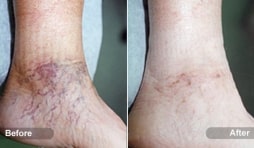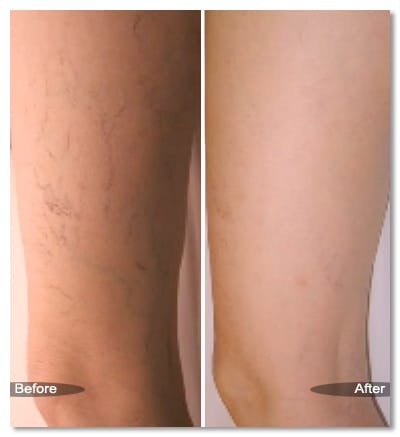
Clear, smooth and youthful-looking skin is an understandable and relatable cosmetic goal for men and women across the map, but as time moves on and the natural aging process takes over, it can be more difficult to attain this standard in the long-term. While it may be easy to point to exterior factors such as sun damage as a primary culprit in skin looking less than its best, sometimes the true problem lies well below the surface.
The development and sudden appearance of spider veins is a common complaint amongst individuals struggling to maintain healthy and smooth skin as they age. While the evidence of spider veins is very much at the surface of the skin, the cause often sits beyond what the naked eye can see. There are a variety of factors that are linked with the development of spider veins, but venous insufficiency is often a big one, and understanding what’s happening within the greater network of veins is a good route to understanding what techniques, like sclerotherapy for spider veins, are best suited to eliminating them. spider veins at the source.
What Causes Spider Veins
Many times, the development of spider veins is closely linked to the development of varicose veins deeper underneath the skin’s surface. Veins work hard to return oxygen-depleted blood back to the heart from the extremities where it’s been delivered by arteries. In order to do this against the force of gravity, it’s necessary for veins to be outfitted with a series of one-way valves. When these valves no longer work properly, blood quickly flows the opposite direction and begins to pool in the veins, causing eventual swelling, discoloration, and the probability of varicose veins in the long-term. With nowhere else to flow, blood begins to look for alternative circulatory routes. When blood branches off from problematic varicose veins, the result is frequently the development of nearby spider veins.
Characteristics of Spider Veins
While spider veins don’t generally come with any associated or painful symptoms, many individuals desire to have them reduced or removed entirely in the name of cosmetic goals. Spider veins can appear anywhere on the body, including across the face, as a webbing of colorful damaged veins. While they are small in nature, spider veins can present in shades of blue, red, or even purple.
Treatment Options
While cosmetic surgeons of the past were very much limited in treating venous insufficiencies such as varicose and spider veins with invasive techniques such as vein stripping—patients today enjoy a wide variety of non-invasive or minimally invasive options when it comes to reducing and eliminating these issues. Amongst these options, ultrasound-guided sclerotherapy has become a very popular choice for those looking to treat spider veins. This technique is particularly helpful for those patients that may have underlying venous issues which, if caught early on, could prevent further development of spider veins in the future.
How Ultrasound-Guided Sclerotherapy in St Louis Works
Patients that elect to undergo ultrasound-guided sclerotherapy in St Louis to treat spider veins begin with a traditional ultrasound procedure over the areas of the body where spider veins are dense or the physician believes there might be underlying problematic veins. The ultrasound allows the physician to locate deeper-lying veins that need attention as well as guide the injection of either liquid or foam sclerosant directly into the veins in question.
In reaction to the sclerosant, the vein spasms to the point of closure and collapse. Eventually, the vein is reabsorbed naturally into the body without causing harm to the surrounding veins or tissues. Ultimately, this leads to the fading and possible elimination of spider veins.
Safety Considerations
Ultrasound-guided sclerotherapy for spider veins is popular in large part thanks to its minimally invasive nature and quick recovery time. Results are proven to be highly effective and the procedure overall is considered extremely safe. Patients are not required to undergo general anesthesia when electing ultrasound-guided sclerotherapy in St Louis, eliminating any of the risks also linked to a large surgery, long hospital stay or lengthy recovery period with significant wounds, stitches, and eventually scars to care for. Instead, this technique uses nothing more than a local anesthetic to keep a patient comfortable and the incision point is so minimal that stitches aren’t necessary and it’s unlikely that a scar will be visible.
Contact the St. Louis Laser Vein Center Today
Whether you’re looking to eliminate pre-existing spider veins, have concerns about potential venous insufficiencies or are simply looking to establish care regarding overall vein health, Dr. Wright and his team at the St. Louis Laser Vein Center are here to help. Contact us today to learn more about the many cosmetic services we offer or to schedule your initial consultation for sclerotherapy for spider veins. With a dedication to comprehensive patient care an unwavering commitment to safety, patients who partner with us become part of the family from the moment they walk through the front door.
Sclerotherapy Treatment FAQs
You may be experiencing skin break down which can happen with any sclerotherapy. It will heal fully but it must be treated properly. I would contact the doctor right away to let them know.
The short answer is most disappear in 6 to 8 weeks but some may take as long as 8 months.
Understanding the sclerosing process is key tracking your individual results. Basic concepts are 1) sclerosing agent is injected and causes damage to the inside of the vein 2) compression is applied that flushes the blood from the vessel 3) the vessel thromboses (clots) 4) the body absorbs the vein and any remaining blood. This last part depending on the amount of tissue or blood may take a short time or a long time. You may track these changes by looking at the treated area. First the inflamed vein will look red and inflamed. Second the vein thrombosis and looks dark blue, if you press on this you will note that the color will not disappear. As the blood gets resorbed the vein will under go a color change to brown, then lighter colors till it vanishes.
Be patient any vein that you can still push the color out of need further treatment.
*Actual Patients: Individual Results May Vary


